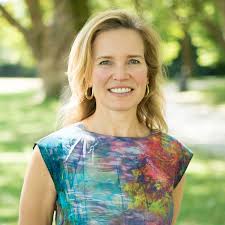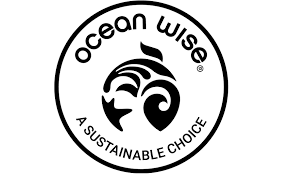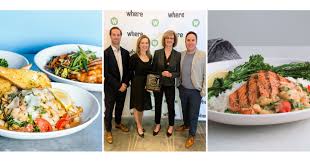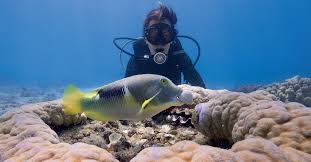Sophika Kostyniuk - Ocean Wise Seafood Manager
Sophika Kostyniuk - Ocean Wise Seafood Manager

Interviewer: Jeannie Huang
What is your job description and what does a typical day look like?
Sophika is manager of the Ocean Wise Seafood Program, which is a National seafood rating program. The logo is the recognizable fish that you see in grocery stores or on menus. She runs both the science and accounts side of the program. She describes it as a “busy space with no dull moments.”
“Today my day started at 5 am PST, with a call with nine other groups from around the globe called the Global Seafood Ratings Alliance. This group has formed over the last 6 years to try to come to an agreement globally on what is ecologically sustainable seafood and what is not. We have different logos out in the world, we have different geographies, but we share the same vision and aspirations for ocean resilience. So that was an hour and half. And then at 9 I had another external meeting with the director of the global ghost gear initiative. Trying to see if there were opportunities for us to overlap in the plastic space. Ghost gear is something that is discarded or lost off fishing vessels. It comprises almost 50% of all ocean plastics found globally. It causes a lot of entanglement for marine mammals; it can post navigation hazards and breaks down into microplastics. Then I had a couple meetings with my team. We meet virtually as we are dispersed across Canada. We did some strategic planning for the new conservation strategy. I had to tackle some financial issues, I’m having an interview with you and more will come after this.”

There is no standard day in the Ocean Wise Seafood program. It is a dynamic job where priorities and needs are ever changing.
Where did you go to school and what did you major in?
Sophika attended the University of Guelph in Guelph, Ontario earning a Bachelor of Science in Ecology. In her first year, Sophika wasn’t in a science or art stream. All the courses were blended, where there was both art and science components. An example of one of her courses was “Whales for Sale” which included whale biology, physiology, and ecology but with a historic case study in economics of whale trade. That program helped her understand she wanted to pursue science, and in her second year she started her degree in Ecology.
This program opened her mind to how all the sciences are interconnected, and how nothing can exist in a vacuum. She noted “If oceans are overfished, or if the climate changes it doesn’t happen in a closed system. There are ripple effects all around the globe. And we as humans are deeply affected by what we do to the environment and what the environment can do to ourselves.” She credits the course with opening her mind to the big picture thinking.
Did you do anything during school to stay involved with the ocean physically?
The University of Guelph is landlocked and nowhere near the ocean. Sophika was most familiar with lakes and rivers as water systems.
“I was fortunate growing up my parents were both high school teachers, so every summer we would travel together because they had summers off. We traveled across North America exploring beaches, oceans – learning to snorkel, dive, surf, playing in the sand, collecting shells. It was meaningful and impactful.”
What got you interested in your job?
Sophika accidentally fell into the Ocean Conservation space. In 2003, she moved to San Francisco, followed her heart and was looking for work. She saw a job popped up to do market campaigning on farmed salmon. It was a coalition of B.C. non-profit groups (David Suzuki foundation, living ocean society, Raincoast Research) and that is what launched her into the ocean conservation space. Working with large retailers on their sourcing policies, working with their state government in California to put in place an organic labelling bill so that no product can be called organic until the USDA developed their own standard. This allowed her to bring several issues to the forefront: the need to protect coastal ecosystems, wild salmon, and the need to farm responsibility. It was be able to bring these issues forward that hooked her in.
Does it every get tiring or repetitive working in conservation spaces?
When asked about frustrations of saying the same thing over and over Sophika had this to say:
“It never gets repetitive if you’re passionate about the issue at hand and if you can help people see how their contributions make a difference and how their actions make a difference. The part that gets frustrating is when people are not interested in participating in meaningful two-way dialogue. So you have to get creative and crafty about what is going to get their attention, what are their values and how are you going to use that as a hook to bring them into the conversation and make this issue that I care so much about personal to them as well.”
What kind of jobs did you have before this one?
Sophika worked at the David Suzuki foundation for 5 years in the Marine team doing similar work as part of the sea choice program. It involved educating the public and helping partners sustainable source. She was also part of the Blue Dot Campaign, as the first National Organizing Manager where she was responsible for growing the grassroots movements and getting municipalities to sign on.
What kind of volunteer/extra curriculars do you recommend to students looking to go into this field?
Sophika didn’t recommend anything specific, but instead encourages youth to follow their passion and not give up. In her words “Chase down internships/placements where you can, don’t be dissuaded by no’s or not right now, try and make personal relationships and go a little bit beyond your comfort zone.”
She also recommends calling people who you think have cool jobs to learn about what they do. A lot of professionals will be generous with their time and they enjoy speaking about their expertise and offering help to young people. In summary she says, “Follow your passions, stay the course, volunteer, and cross your fingers a little bit too.”
What is the best part of your job? Are there any parts that you do not like?
Sophika says the best part of her job is working with her team, who she describes as “inspired, passionate, creative, and smart women.”
“It’s fun to be on an all women powerhouse team. They are a daily inspiration. I really love the global work, connecting with other organizations around the world that have similar missions and visions. It helps reinforce that nobody is in this alone, there are shared values around the globe. People want to see the same type of change around the world.”
She also likes working in the innovation space her job provides.
“When we hear that fisheries are adapting the gear, they use to catch species so they’re not negatively impacting habitats or creating bycatch, things like that are super exciting. The ocean plastic space, cleaning up our oceans, it’s very inspiring.”
Her least favourite part is the necessary financial, accounting and contract work. She understands that they are important as she cannot do the work without those pieces but admits it is more of struggle to get motivated to do it.

Are you working on/studying any unique projects?
In the early days, when she was down in California working on a new campaign in a place that had never heard of B.C. farmed Salmon, even though they were importing a big amount. The impacts their purchases were having on B.C and coastal communities was not seen in these places because it was so far removed. This meant the conversations didn’t really have a starting point for about a year, so she had to get crafty in developing messaging. She had to figure out how to convince a grocery store to care about what she had to say, about the environmental issue in Canada when they are 900 miles south of there in the southern USA. This meant getting persistent, learning what has worked for other campaigns in the past, learning how to speak corporate talk, and dressing like her corporate counterparts.
It also involved doing research on people and their motivations and drivers and doing the heavy work up front, not knowing whether it was going to yield results.
Currently with Ocean Wise, she is working on building out a vision for the next ten years for programs in the conservation department. Sophika can image what change we want to create in the next 10 years, which is linked to IPCC report that concluded we have 10 years to turn our situation around, so that’s the window in which were working.
In your opinion, what is the biggest problem facing the ocean? And how can we take action towards solving it?
Sophika says that the work that she does changes her perspective, but “unsustainable large-scale overfishing has been extremely destructive to ocean ecosystem and resilience. It damages habitats, depletes biodiversity, creates pollution. There are a lot of serious human rights issues that are problematic in seafood supply change. So overfishing is a big driver of those concerns.”
She also mentions climate change and the lack of ability of the ocean to absorb more carbon which is linked with that is ocean acidification, bleaching, warming waters but notes it is all part of the same issue.
When asked what message she has for people who think these issues are far away Sophika said:
“We don’t live in a bubble. Air, water circulates around the planet. So, if the great barrier reef is affected in in terms of its oxygen creating properties, we all suffer. If there are less fish that are coming out of that system, people don’t have the ability to feed themselves it puts stress on other global systems, so we are all impacted. The oceans don’t know where boundaries lie, so if there are bleaching events it means something serious is happening to all the worlds oceans, we’re just seeing it show up very blatantly on the Great Barrier Reef, but guaranteed there are other ripple affects occurring around the planet so we should be really concerned.”
What is your favourite ocean organism (or project) and why?
Sophika says it is nearly impossible to choose her favourite ocean species, but right now, there is one amazing new fish called the Tusk Fish, which comes from Australia. The tusk fish has teeth, and it is the first documented fish that actually uses tools to eat its food. The tusk fish loves a specific clam, and every morning it swims way out, digs up these clams and then it takes it back to a circular coral, holds the clam in it’s mouth and then it smashes the clam into the coral bowl persistently until the shell cracks open and then it gets to eat the insides. The tusk fish is a great example of everything we are still learning about the oceans. In Sophika’s words: “There’s so much we don’t know about the oceans yet; we need to give fish more respect.”

